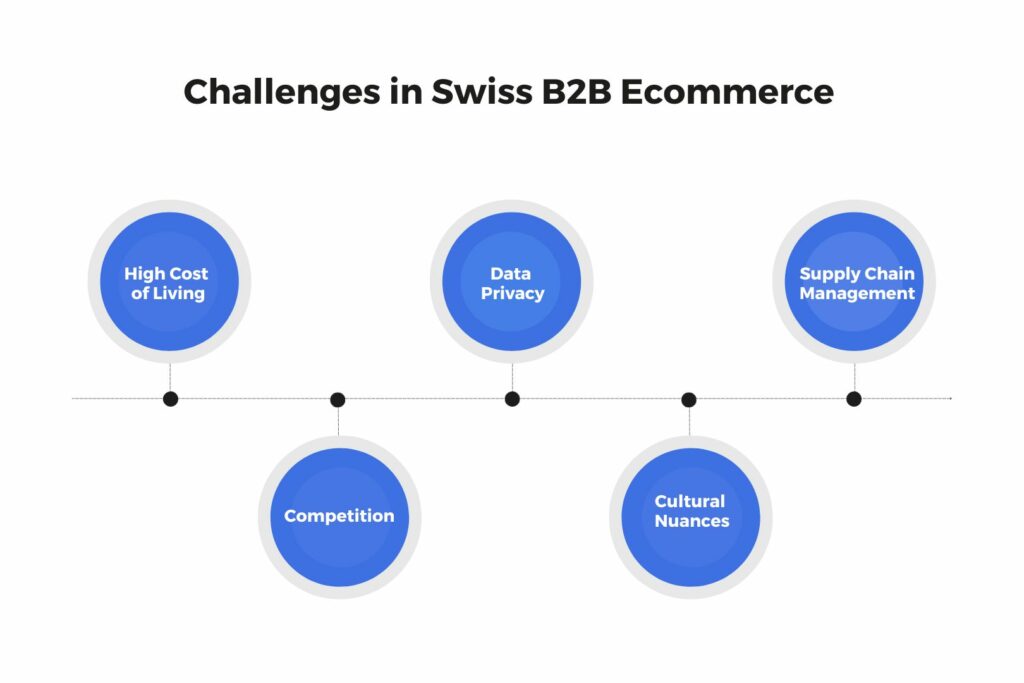Switzerland, a nation renowned for its picturesque landscapes, precision watches, and delectable chocolates, is also making waves in the world of B2B ecommerce. As the digital age continues to reshape the business landscape, Switzerland has seamlessly transitioned into the region of online commerce, offering a host of unique opportunities and challenges for B2B ecommerce businesses.
B2B ecommerce in Switzerland is a growing market, with a projected value of USD 14.51 billion in 2023. This growth is being driven by a number of factors, including the increasing adoption of digital technologies by Swiss businesses, the growing popularity of online marketplaces, and the convenience and efficiency of ecommerce. Cloudfy is a cloud-based B2B ecommerce platform that has been recognized for its capabilities in serving the B2B ecommerce needs of various businesses.
Table of Contents
The Swiss Landscape for B2B Ecommerce
Switzerland boasts a thriving B2B ecommerce ecosystem that is bolstered by several key factors:
High Internet Penetration
According to the latest Statista data, the internet penetration rate in Switzerland is estimated to reach 96.55% in 2028. This means that nearly all Swiss citizens will have access to the internet, making it a vast and tech-savvy customer base for B2B ecommerce.
Strong Economy
Switzerland’s robust economy and reputation for precision and quality extend to its ecommerce sector. It’s a market that appreciates excellence and is willing to pay for it.
Favorable Regulatory Environment
Switzerland is known for its business-friendly environment and political stability. This provides a secure backdrop for B2B ecommerce operations, including secure online transactions.
Multilingual and Multicultural Environment
Switzerland’s linguistic diversity (with four national languages – German, French, Italian, and Romansh) and multiculturalism create unique challenges and opportunities for businesses seeking to operate in this market.
Logistics and Connectivity
Switzerland’s central location in Europe and excellent infrastructure make it a strategic hub for distribution, facilitating efficient supply chain management and timely deliveries.
High Demand for Precision and Quality
Swiss businesses prioritize precision, quality, and reliability in their operations. This extends to their supplier relationships, providing opportunities for B2B ecommerce players who can meet these standards.

Challenges in Swiss B2B Ecommerce
While Switzerland offers a plethora of opportunities for B2B ecommerce businesses, there are also notable challenges:
High Cost of Living
Switzerland is known for its high cost of living and doing business. This can result in higher operational costs, including labor and infrastructure expenses.
Competition
As more businesses recognize the potential of the Swiss B2B ecommerce market, competition is intensifying. You must stand out through innovative solutions and excellent customer service.
Data Privacy
Swiss consumers are particularly sensitive about data privacy. Adhering to strict data protection laws is crucial, and mishandling customer data can lead to reputational damage and legal consequences.
Cultural Nuances
Switzerland’s diverse culture and languages mean that understanding and respecting cultural nuances is essential for success. Missteps in this area can alienate potential customers.
Supply Chain Management
Switzerland’s geographic location means that efficient supply chain management is critical. Delays in logistics or supply chain disruptions can harm your reputation.

Leveraging Swiss-Based Strategies in B2B Ecommerce
In Swiss B2B ecommerce, it’s crucial to use different languages and focus on local marketing. Let us discuss the key strategies for success in Switzerland’s diverse market and staying within the country’s strict rules.
Multilingual Capabilities
Localized Marketing
Switzerland’s multilingual environment is a double-edged sword. It presents a challenge in terms of catering to diverse linguistic audiences, but it’s also a unique opportunity to stand out by offering content in multiple languages. Cloudfy embraces the nation’s linguistic diversity and can help your B2B ecommerce site connect with a broader customer base.
Swiss consumers, much like their counterparts worldwide, appreciate personalized experiences. Cloudfy can enable you to create tailored content, offers, and promotions for specific regions in Switzerland. Whether you’re targeting the German-speaking region of Zurich or the French-speaking area of Geneva, localization can make your B2B ecommerce site more appealing and relevant.
Customized Inventory and Product Offerings
Switzerland’s diverse business landscape means that the demand for products and services can vary significantly from one region to another. Leveraging Cloudfy’s B2B ecommerce platform, you can optimize your inventory and product offerings to align with the specific needs and preferences of each region. This ensures you’re not overstocked with items that have limited demand in certain areas.
Timely Deliveries and Efficient Logistics
Switzerland’s central location makes it a logistical paradise. Embrace location-based strategies to ensure that your distribution centers and delivery routes are optimized for quick and efficient deliveries. Swiss businesses value punctuality and reliability, and meeting these expectations can set you apart.
Compliance and Regulation
Switzerland’s regulations, especially in sectors like finance and healthcare, can be quite strict. A location-based approach is vital for ensuring that your B2B ecommerce operation complies with Swiss laws and regulations. This includes data protection, tax laws, and industry-specific regulations.
Switzerland’s landscape for B2B ecommerce is as diverse as its topography. Businesses that leverage B2B ecommerce strategies to address the unique challenges and opportunities this market presents can carve out a niche and thrive. From multilingual capabilities to localized marketing and efficient logistics, a tailored approach to Swiss B2B ecommerce can unlock the door to success in this prosperous and picturesque country. Whether you’re a newcomer to the Swiss market or looking to expand your existing operations, embracing Cloudfy’s cloud-based B2B ecommerce platform is best for you. It offers features and capabilities that align well with the unique demands of the Swiss market. Its focus on scalability, localization, compliance, security, and customer support can make it a strong choice for B2B ecommerce businesses in Switzerland. However, it’s essential to assess the platform’s latest offerings, consider your specific business requirements to determine how well it aligns with your needs in the rapidly evolving field of B2B ecommerce.
Case study: Movora
Switzerland-based veterinary medical device manufacturer, Movora, faced the challenge of streamlining their complex purchase order process. They needed a user-friendly B2B ecommerce solution that allowed their veterinary clients to efficiently filter and order joint replacement parts and accessories. Cloudfy provided a multi-variant system with advanced search and related product features, automating the ordering process and enabling online tracking for the medical devices. Integration with Microsoft Dynamics Business Central ERP improved invoice management, and Cloudfy’s user-friendly interface streamlined reorders. The solution significantly enhanced efficiency for Movora’s B2B distribution business.
Does your B2B ecommerce need a more efficient purchase ordering process or a better ecommerce platform? If so, contact us now to request your free Cloudfy demo.
Frequently Asked Questions
The growth of B2B ecommerce in Switzerland is driven by factors such as increasing adoption of digital technologies, the popularity of online marketplaces, and the convenience and efficiency of ecommerce.
The major challenges in Swiss B2B ecommerce include the high cost of living, intense competition, data privacy concerns, cultural nuances, and the need for efficient supply chain management.
To stand out in the competitive Swiss B2B ecommerce market, you should consider offering multilingual content, using location-based marketing, customizing your inventory, ensuring timely deliveries, and complying with Swiss regulations.
Movora, a Switzerland-based veterinary medical device manufacturer, streamlined their purchase order process using a user-friendly B2B ecommerce solution. This case study highlights how Cloudfy improved their efficiency and integration with Microsoft Dynamics Business Central ERP.
You can request a free Cloudfy demo for your B2B ecommerce needs by contacting them directly. Their solution offers features and capabilities that align well with the unique demands of the Swiss market.






